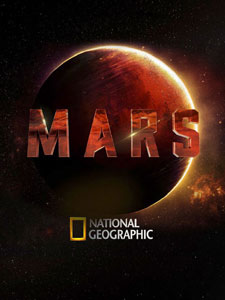From the beginning, “Mars” (9 p.m. Eastern Mondays on National Geographic) has aimed to show what humanity’s colonization of the Red Planet will really be like. Season 1, which aired back in 2016, chronicles the travel and settlement in the 2030s. Now Season 2 brings us into the 2040s, after the initial challenges have been conquered.
The show’s adherence to realism (with cutaways to real-world experts backing up what we see in the fictional plot) sets it apart from most science fiction, sure, but it also makes the Red Planet strikingly mundane. The biggest threats don’t come from monsters or aliens, extreme weather, or even scientific struggles like in “The Martian”: They now come from fellow humans.
The drama of “Mars” Season 2 does not play well in a brief pitch. The international scientific settlement, IMSF, is joined by a corporate settlement, Lukrum, that aims to drill for oil or whatever other goodies Mars has to offer. Admittedly, there’s nothing off-point about episode one, winkingly titled “We Are Not Alone”; it’s just that I wonder if people want to watch a political drama transposed to the Red Planet.
Lukrum’s lieutenant, Michael Glenn (Gunnar Cauthery) tells IMSF leader Hana Seung (Jihae Kim), that Lukrum will be hooking up to IMSF’s water supply. It wasn’t pre-negotiated, but Lukrum purposely shows up without enough water, knowing it can brazenly take advantage of IMSF. The scientific settlement won’t turn Lukrum down, based on its morals and international space law about helping fellow travelers.
And the corporation is correct. Its leader back on Earth, Esai Morales (Roland St. James), further plays politics against IMSF secretary general Cosima Shaw (Leslie Richardson) – whose background is in science — and Lukrum gains more power, climbing on the shoulders of IMSF. We’re seeing corporatism play out on Mars, but Lukrum’s advantages are gained through old-fashioned manipulation rather than palm-greasing.
“We Are Not Alone” plays up the similarities between Arctic oil drilling ventures and early exploitation of Mars, and these comparisons are on point, but it’s the differences that are interesting. If the conflict of this episode happened on Earth, IMSF would simply turn Lukrum away. But on Mars, the politics are much simpler for someone who wants to exploit them.
It’s a mix of the frontier and the modern Earth political structure; the episode’s comparisons to the Gold Rush are valid, and perhaps further nods to the Wild West might be warranted as Season 2 goes forward. As Michael Glenn points out, Lukrum isn’t beholden to international law because it didn’t sign a treaty. In addition to getting a share of IMSF’s water, it goes a step further and cuts through their scientific field to make the hookup go faster. IMSF’s Robert (Sammi Rotibi) is injured in the rushed pipeline construction, but we know a well-crafted apology should be a sufficient patch job in the political sphere.
And early bad behavior need not hurt the corporation in the long run. One need look no further than the United States itself to find a corporate/political entity that started off by taking advantage of its fellow man and ultimately positioned itself as an international leader – “morals” backed by military might.

It’ll be interesting to see how quickly warfare comes to Mars. Yes, politics is the main point of episode one, and rightly so: IMSF can’t turn away Lukrum, thus dooming its workers, because it’s immoral and it would be a devastating blow to its image, the ultimate bad optics. On Earth, though, political views are backed up by weapons (law enforcement domestically; military on the international stage), and that element is intriguingly missing from Mars so far.
I’m somewhat surprised that “Mars” skims over the medical logistics of Martian settlers traveling back to Earth. We know Cosima Shaw has made the journey back; she is the widow of the botanist who goes mad in Season 1 and kills himself by leaving the habitat without a spacesuit.
“We Are Not Alone” doesn’t ignore health concerns, as they are central to the reason why Javier (Alberto Ammann) can’t join his homesick girlfriend Amelie (Clementine Poidtaz) on the next ship to the Blue Planet. His body is not prepared for the return to Earth’s conditions. We aren’t told what workout or medical regimen Amelie has undergone to prepare herself. Details might be interesting for a future episode.
Or maybe not. It depends on how engaging you find scientific logistics to be. The odd thing about “Mars” is that the cutaways to experts dryly talking about space-exploration challenges are the superior part of this two-pronged show. When “Mars” cuts back to the fictional drama, it loses momentum. While there’s no Matt Damon in the bunch, the performances aren’t necessarily bad, and indeed the variety of accents (some thick enough that you’ll want your TV’s closed-captioning on) is believable for a cooperative international mission.
And the planet is convincingly dangerous. But because of the analysis (both from the real-world experts and what’s worked into the script), it’s predictably dangerous. “Mars” struggles to entertain while it teaches.

